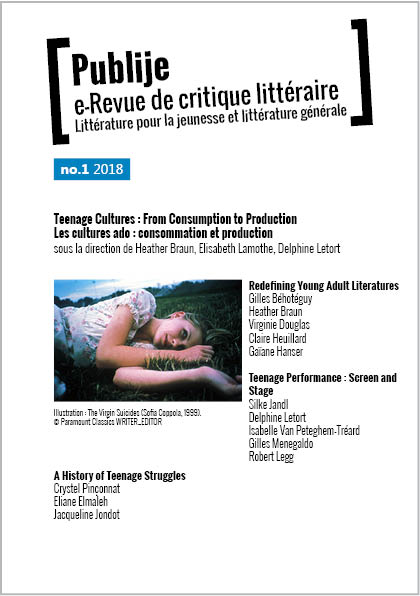The Success and Ambiguity of Young Adult Literature: Merging Literary Modes in Contemporary British Fiction
Mots-clés :
Fantasy, fiction britannique, littérature pour enfants, réalisme, roman pour jeunes adultes, British fiction, children’s book, fantasy, realism, young adult novelRésumé
This paper focuses on novels addressed to that category of older teenagers called “young adults”, a particularly successful category that is traditionally regarded as a subpart of children’s literature and yet terminologically insists on overriding the adult/child divide by blurring the frontier between adulthood and childhood and focusing on the transition from one state to the other. In Britain, YA fiction has developed extensively in the last four decades; this article examines what this literary emergence and evolution has entailed since the beginning of the 21st century, especially from the point of view of genre and narrative mode. British YA fiction is deeply indebted to and anchored in the American tradition, which proclaimed the end of the Romantic child as well as that of the compulsory happy ending of the children’s book. However, there seems to be a recent trend which consists in alleviating the roughness, the straightforwardness of realism thanks to elements or touches of fantasy. British YA fiction, coming close to what could sometimes be called “magic realism”, mingles subgenres to produce experiments in form that suggest the particular state of young adulthood. By creating textual hybridity, these generically ambiguous novels mirror the in-betweeness of their intended audience.
Cet article se penche sur les romans destinés aux grands adolescents ou « jeunes adultes », catégorie qui connaît un engouement particulier et que l’on considère traditionnellement comme une subdivision de la littérature pour la jeunesse bien que, d’un point de vue terminologique, elle mette en avant le dépassement de la division adulte/enfant en brouillant les frontières entre ces deux âges de la vie pour mieux se concentrer sur la transition d’un état vers un autre. En Grande-Bretagne, la fiction pour jeunes adultes s’est développée de façon significative au cours des quatre dernières décennies ; cet article s’intéresse aux effets qu’ont eus cette émergence et cette évolution littéraires depuis le début du XXIe siècle, en particulier en termes de genre et de mode de narration. La fiction britannique pour jeunes adultes est ancrée dans la tradition américaine, pionnière en la matière, dont elle s’inspire largement et qui a mis un terme à une vision romantique de l’enfance ainsi qu’à l’obligation du happy ending dans le livre pour enfants. Cependant, une tendance récente semble s’employer à atténuer un réalisme âpre et brutal grâce à des éléments, voire de petites touches de fantasy. La fiction britannique pour jeunes adultes, qui flirte parfois avec ce qui s’apparente au « réalisme magique », entremêle différents sous-genres pour parvenir à des expériences formelles suggérant l’état particulier dans lequel se trouve le jeune adulte. Grâce à la création d’une hybridité textuelle, ces romans ambigus d’un point de vue générique, reflètent l’entre-deux du lectorat auquel ils s’adressent.
Téléchargements
Publiée
Comment citer
Numéro
Rubrique
Licence
Les auteurs qui publient dans cette e-revue acceptent les termes suivants :
Les auteurs conservent le droit d'auteur et accordent à la revue le droit de première publication, sous la licence Licence d’attribution Creative Commons permettant à d'autres de partager les articles tout en en reconnaissant la paternité et la publication initiale dans cette revue.





